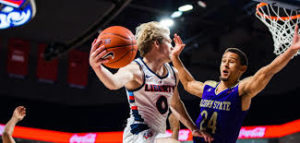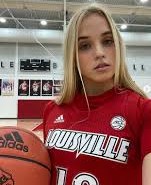We are keeping our fingers crossed in the hope that we can return to a “normal” version of college basketball this fall: fans in the stands, announcers without masks, etc. Nobody knows exactly what is going to happen but we will try to restore some order with season previews featuring the best players/coaches in the country. We continue our coverage with new Lamar head coach Alvin Brooks. HoopsHD’s Jon Teitel got to chat with Coach Brooks about facing his son in the Final 4 last April and his expectations for this season.
As a freshman at Sam Houston you set a school record with 165 AST and were named conference ROY: how were you able to come in and contribute right from the start? I had a really good coach in Denny Price (the father of former NBA players Mark/Brent Price). I verbally committed to Washington because I always wanted to go west, but at the last minute I realized that my family might not get to see me play a lot in person so I decommitted late in the spring. Sam Houston was in the Lone Star Conference at the time (which was pretty strong). Coach Price put the ball in my hands and allowed me to create opportunities. I saw a lot of high school friends who ended up playing in the NCAA tourney so I transferred in an attempt to make that happen for myself.
You transferred to Lamar and reached the 1980 Sweet 16 after beating Weber State/Oregon State: what are your memories of your great run in the tourney? I was not recruited to be “the guy” but ended up winning a starting spot. My son Alvin was actually born while I was a junior at Lamar. We played Weber State on their home court: they were nationally ranked after winning the Big Sky. We watched them on film and they were really good. Rashard Lewis’ dad Cestrakiah, Mike Olliver, BB Davis, and the rest of us went there as underdogs: we were up by 20 PTS and hung on to win by 1 PT. Oregon State was really big and had a Hall of Fame coach in Ralph Miller but we were really fast and were playing with a lot of confidence after a 2-PT loss at #1 DePaul at the buzzer that January. We were 80 minutes away from making the Final 4 but lost to a big Clemson team who started a trio of 6’10” guys: it was unbelievable. We came back to Beaumont after the Oregon State game: I remember the police pulling our bus over and the mayor hopped on the bus to join us for the rest of the ride east from Houston. We arrived at the gym and it was packed to the ceiling with fans who were there to welcome us back. We generated a lot of support and people still talk about our teams from that era: we had a lot of home sellouts. That trip was the catalyst to putting us on the national stage and did a lot of things for our school. Our game was on NBC and I was named MVP of the Oregon State game: my family could not watch it in Houston so they drove to Beaumont and rented a hotel room just to be able to watch us! The tourney run also helped our coach Billy Tubbs get his next job at Oklahoma.
In the summer of 1981 you were drafted by San Antonio: how close did you come to making the team, and how did you get into coaching? I got cut because they already had several guys with guaranteed contracts. Coach Mo McHone thought that I had a chance to make the CBA but after having a son my whole focus changed and I did not want to chase my dream if it meant leaving him behind. I was a graduate assistant at Lamar while finishing up my degree. I wanted to coach because my mentor Jackie Carr was a legendary high school coach and I wanted to be like him. To return to Lamar 40 years later is like a storybook: I have been extremely blessed to have these opportunities.
In 1993 you were named head coach at Houston, becoming the 1st African-American head coach in school history: how big a deal was it at the time? When Coach Pat Foster left for Houston in 1986 he invited me to come with him. It was a bigger deal than I was willing to admit at the time. There was a lot of stuff written about it at the time but I had no idea at 1st. I ended up putting a lot of pressure on myself as a trailblazer but did not have any experience in hiring. I was a young 1st-time head coach and after the faculty senate voted to do away with athletics I had to deal with stuff like ordering fax machines: it was challenging! We finished 2nd in the conference by the end of my 3rd year. I became the lightning rod to talk about whatever was not going right. I had to get my own shoe deal, which was important so that I could have a summer camp, and had to hire a new secretary/trainer on the fly. You do not learn about that stuff in coaching clinics or during undergrad but now there is nothing that fazes me.
You spent the past several years as an assistant to Kelvin Sampson at Houston: what makes him such a great coach, and what was the most important thing that you ever learned from him? It is hard to be the same person every day but that is what he is. He is an intense dude but a good dude who does a really good job of having teams that execute on both ends of the court every day. He organizes his practices well and is good at delegating responsibilities and then holding everyone accountable. He is also a great family guy. I have helped with some rebuilding jobs at other schools but it was a blessing to be a part of Kelvin’s program for the past several years.
Last year you made the Final 4 before losing to eventual champion Baylor, where your son Alvin III is an assistant: what was it like to face your son, and how excited were you to see him win the title 2 nights later? I was super-excited to see him win a title, but it is actually his 3rd because he won 2 more at the junior college level (with Arkansas-Fort Smith in 2006 and with Midland College in 2007). It is never fun to play/coach against him because 1 of us has to lose. We had faced each other a couple of times before but this was the 1st time where he was on the winning end. Either way there was going to be a “Brooks” in the national title game, which was pretty cool. I took a photo of the scorebook after we both entered our starters in it and then added our initials. That was probably the coolest part because once the game started we were both trying to win.
You were hired as head coach at Lamar last April: why did you take the job, and how is it going so far? I wanted to become a head coach again and I am not afraid to rebuild a program. I have enough energy left to do that but never imagined that it would be here. I wanted to be in the Southwest region but never thought that would be possible. I knew that they had struggled for a long time with 9 head coaches over the past 35 years: 7 of them finished with losing records. I have only taken 2 years off in the past 40 years so I know that you cannot just wave a magic wand and start winning games. I researched the program and talked to Coach Tic Price so I have a good understanding of how we need to do things. Coaches win games but administrations win championships.
In 2019 you were inducted into the Cardinals Hall of Honor: where does that rank among the highlights of your career? I was honored just to be recognized by my alma mater. I only played here for 2 years so I never expected to be in the Hall…but they were 2 really good years and I was a part of some of the best teams in school history. It was also cool to join some of my former teammates in the Hall.
You have 13 players on the roster from Texas: what sort of recruiting philosophy do you have? I grew up 80 miles from here in the heart of Houston and there are a lot of good players between Beaumont and Houston so we will start within a 100-mile radius. You have to be really good at developing the players you have and you also need a good coaching staff/game plan. Recruiting in-state is my strength and that is what we need here. We will start in the surrounding communities and then go west from there toward greater Houston. We will zero in on who fits: with all of the guys who are transferring these days I do not need to guess who will fit here because I played here myself.
What are your goals for this season, and what are your expectations for this season? The goal every year is always to compete for a conference championship even though it is Year 1 for me. There has only been 1 conference title here in the past 35 years and we moved into the WAC, but that is our goal. We want to lay the foundation and build our culture.









